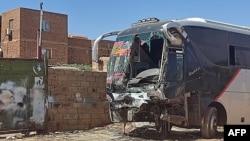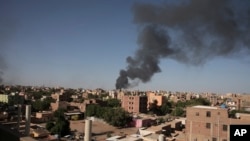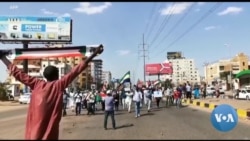Rival forces battling in the streets of Sudan’s capital declared a new 24-hour cease-fire Wednesday, a day after a similar truce attempt failed.
The Sudanese armed forces and the paramilitary Rapid Support Forces, or RSF, announced separately that they would abide by a temporary halt in fighting beginning at 6 p.m. local time, or 1600 UTC.
There were reports of sporadic fighting after the cease-fire went into effect.
In Washington, White House press secretary Karine Jean-Pierre called for both sides to respect the truce, "renounce violence and return to negotiations." She said the country's two top generals, whose forces have turned the capital into a war zone for the past five days, "are responsible for ensuring the protection of civilians and non-combatants."
Heavy fighting was reported earlier Wednesday around the main military headquarters in Khartoum, with military jets launching airstrikes on RSF forces attempting to take control of the complex.
Streets in the capital were empty except for fighters and people attempting to flee the city, some leaving on foot, some crowding into vehicles. Most residents have sheltered indoors to avoid the fighting, enduring a cutoff in electricity and dwindling food supplies.
"Khartoum has become a ghost city," said Atiya Abdalla Atiya, secretary of the Sudan Doctors' Syndicate, who is still in the capital.
The fighting has killed nearly 300 people in the past five days, the U.N. health agency said, but the toll is likely higher, since many bodies have been left in the streets, unreachable because of the clashes.
World leaders have pressured General Abdel Fattah al-Burhan, the commander of Sudan’s military, and General Mohamed Hamdan Dagalo, head of the Rapid Support Forces, to call a halt to the fighting. The rival forces agreed to a cease-fire Tuesday after speaking separately by phone with U.S. Secretary of State Antony Blinken, who appealed for a truce on humanitarian grounds. The cease-fire fell apart within minutes and fighting raged throughout the day on Wednesday.
Watch related video by Anita Powell:
Japan announced Wednesday it has begun plans to evacuate about 60 of its citizens from Sudan aboard military planes amid the worsening situation in Khartoum.
The U.S. State Department told VOA on Wednesday it has been in communication with American citizens about safety measures and other precautions, adding that it is unaware of any deaths or injuries of U.S. citizens in Sudan.
Sudan’s military said four Egyptian military transport planes evacuated 177 Egyptian soldiers who were being held by the RSF. The Egyptian troops had been in Sudan to conduct joint exercises with the Sudanese military.
Calls for dialogue
The fighting between the army and RSF broke out Saturday after months of rising tension over the country’s political future and plans to integrate the RSF into the national army.
Calls to end the fighting have come from around the world and within Africa, including the African Union, the Arab League and East African regional bloc IGAD, the Intergovernmental Authority on Development.
Sudan's two top generals, however, have yet to express a willingness to negotiate and each has demanded the other's surrender.
Dagalo said Monday on Twitter that he was defending democracy in Sudan and called Burhan a "radical Islamist." Dagalo's forces emerged from the notorious Janjaweed militias in Sudan's Darfur region and have been accused of carrying out atrocities in the region.
The clashes are part of a power struggle between General Burhan, who also heads Sudan’s ruling military council, and General Dagalo, also known as Hemedti, the deputy head of the council. The two generals joined forces in October 2021 to overthrow the transitional government formed after the 2019 ouster of longtime autocratic leader Omar al-Bashir.
The restructuring of the military was part of an effort to restore the country to civilian rule and end the political crisis.
VOA English to Africa's Carol Van Dam Falk, VOA Africa correspondent Mariama Diallo, VOA U.N. correspondent Margaret Besheer, VOA White House correspondent Anita Powell, VOA State Department Bureau Chief Nike Ching and VOA reporter Michael Atit contributed to this report. Some information came from The Associated Press, Reuters and Agence France-Presse.









